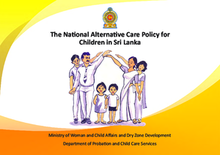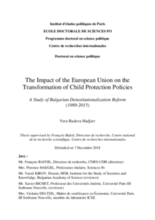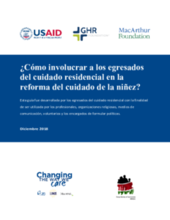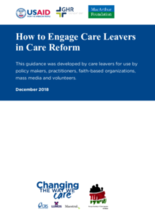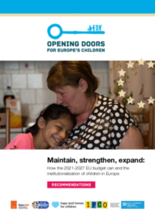Displaying 311 - 320 of 946
Sri Lanka's National Policy on the Alternative Care of Children outlines a comprehensive range of alternative care options and encourages the reforming of all formal structures that provide at-home and out-of-home services for children deprived of care and protection or at risk of being so. This policy also extends to children under care of the Juvenile Justice System. It provides policy solutions to programming for children at risk of family separation and facing deprivations such as child abuse, neglect, child labor, poverty, addiction, imprisonment, human trafficking, mental and physical disabilities, HIV/AIDS, domestic violence, orphanhood, abandonment and displacement etc. The policy also takes into consideration and encompasses provisions to children who are forced to live and work on streets.
This doctoral research explores how the European Union membership has changed the post-communist heritage of institutional care in Bulgaria, focusing on the transformation of orphanages through the deinstitutionalization reform
Esta guía promueve la participación de los egresados del cuidado residencial de una forma empoderada, siendo siempre sensible a sus historias y experiencias. Promueve la dignidad, respeta los derechos y crea un espacio para que sus voces aboguen por un cambio positivo.
This guidance was produced with the Kenya Society of Care Leavers to address how to best engage care leavers - who may have suffered personal trauma in their past and may not have an existing safety net to protect them, yet have a very important voice - in care reform.
These recommendations have been developed by the Opening Doors for Europe’s Children campaign and are based on the work of the campaign since 2016, calling for a stronger commitment to maintain, strengthen and expand the use of EU funds for deinstitutionalisation reforms in Europe.
This report has two aims: (1) examine how well African governments are delivering on their promises and commitments to children and (2) provide a comprehensive, quantitative and qualitative view of the current realities and trends in the state of child wellbeing in Africa, and their implications for the future.
The alternative care for children newsletter provides updates following assessment workshops on care reform that were conducted in Armenia, Ghana, Moldova, and Uganda.
Using the data from a a nationwide evaluation of accessibility of employment and education in Latvia, the authors of this paper argue that due to the fragmented implementation of deinstitutionalisation (DI) and lack of a child centred approach throughout the education sector, despite educators firmly believing they are acting in the best interests of children, current practices of care contribute to the creation of ‘inclusive exclusion’
In this paper, the urgent need to strengthen the child protection system in India is presented in the context of the Integrated Child Protection Scheme and relevant juvenile justice legislation.
This country care review includes the care-related Concluding Observations adopted by the Committee on the Rights of Persons with Disabilities.

